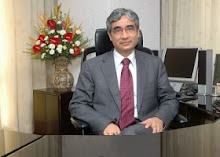The ordinary citizen only occupies a chair of authority; but the enlightened citizen occupies it and also adorns it. Here we can see the distinction between small men and big men. Small men are not men doing small work, but doing all work with a small mind; and big men are not men doing big work, but doing all work with a big mind and heart. There is no distinction between big and small with respect to work, according to the Gita. That distinction applies to the buddhi or reason behind the work. Some people achieve bigness only by sitting on a big chair of authority and power; some other people impart their own bigness to whatever chair they sit on.
It is the natural bigness, this inherent greatness, with its natural dignity and self respect and respect for others, that comes to man as enlightened citizen, compared to man as a formal citizen, as a mere job-holder and functionary. When we have such enlightened and alert citizens, we shall also automatically have alert parliamentarians, and citizens, and other legislators, alert administrators, alert teachers, and alert working class. That alertness catches the pulse of the urges and aspirations of the people in various fields of national life, and responds to them readily and effectively – be it from a primary school classroom, a university research laboratory, an industrial executive's office, or the government secretariat.
Swami Ranganathananda
EXTRACTS FROM: Eternal Values for a Changing Society Volume IV - Democracy for Total Human Fulfilment; 1 - Enlightened citizenship and our democracy (Pg:43-44; ed. 1993)
This was the inaugural address at the Symposium on Enlightened Citizenship organized by the Ramakrishna Mission, New Delhi - held on April 27, 1980.
courtesy: humanpossibilities.blogspot.com
Vedanta: Science of Human Possibilities





No comments:
Post a Comment